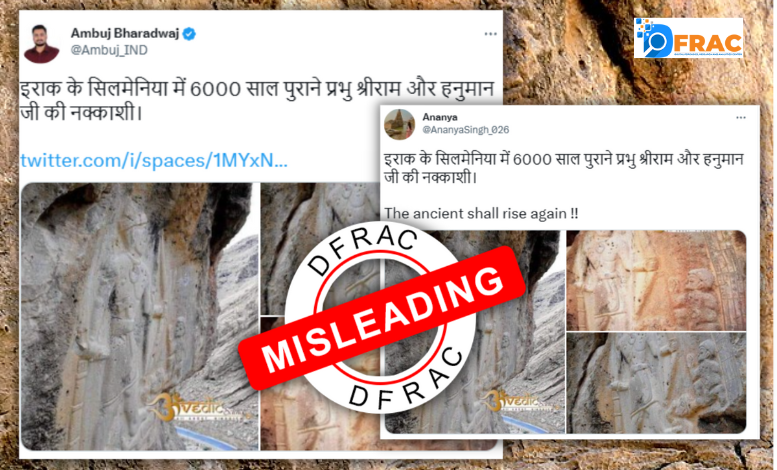A rock carving is going viral on social media. It can be seen that a man holding a bow, a quiver of arrows at his side and a sword in his belt, and a supplicant with folded palms.
Social media users are claiming that it is a carving of lord Rama and lord Hanuman.
By sharing this picture a user Ambuj Bharadwaj captioned: “ 6000-year-old Lord Shri Ram and Hanuman ji carvings in Silmania, Iraq.” ( English Translation ).
Source: Twitter
Meanwhile, many other social media users are sharing similar posts.
Source: Twitter
Source: Twitter
Source: Facebook
Source: Facebook
Fact Check:
To know the reality of the viral claim, the team of DFRAC did the reverse image search of the viral image, the team found that Tripadvisor has covered this report with the headline stating: “ The Akkadian Rock- Relief of Darbandi Belula, dates back to 2200 BC, which represent the victory of King “Tardoni” on his enemies.”
Source: tripadvisor
On further search, the team found that several media houses had also covered this report in the year 2019.
Source: timesofindia
We also found the Wikipedia page and world history covered in its report.
Source: Wikipedia
Source: worldhistory
The reports further mention, This rock relief date back to the Akkadian era. It lies on the cliff of the MT. Darbadi Bilula, Hori, and Shekhan area, Sulaimaniya, near the Iranian border, Iraq.
The Akkadian cuneiform inscription on the right side mentions the name of the warrior as “Tar…dunni” son of Ikki. The names of the gods, Shamash and Adad, were mentioned also.” TAR…Dunni” might have been a local king, prince, ruler, or a high-ranking official, probably Lullubian.
To know more about Tardunni we searched on google and found Wikiwand had described Tardunni which can be read here.
Source: wikiwand
A YouTube channel named Osama Shukir Muhammed Amin uploaded a similar rock carving video on 9 May 2019.
Source: YouTube
Conclusion:
It is clear from the fact check of DFRAC and several media reports that the viral rock engraving is not of lord Rama and hanuman but of local king Tardunni. Therefore, the claim made by social users is misleading.





